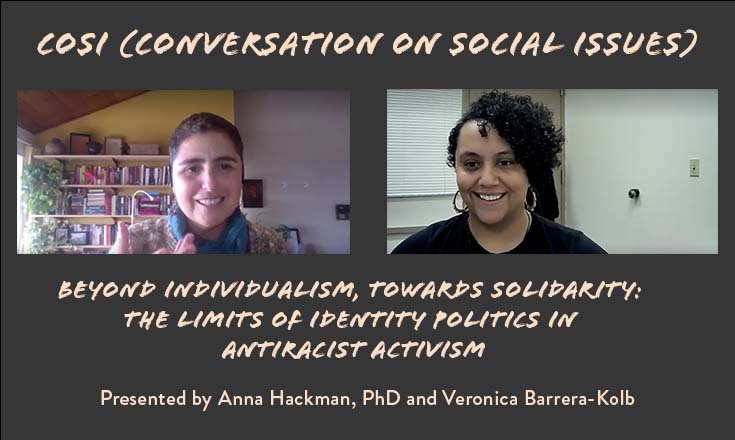On Thursday, Dec. 2, the Seattle Central College Library hosted the last Conversations on Social Issues (COSI) session of the quarter. Central humanities professors Anna Hackman, Ph.D., and Vero Barrera-Kolb presented on the limits of identity politics in anti-racist activism in the context of individualism.
Hackman and Barrera-Kolb cited emerging issues in activism and scholarship work related to identity politics and individualism. Standing against the individualization of oppression and exploitation, the professors said identity politics discourage understanding collectively shared experiences and solidarity.
The conversation began by prompting the audience to think about characteristics used to describe leadership — inspire change, guide and motivate a group, and to direct resources — were a few brainstormed by the group.
“Imagine if we all had to be that, and we all had to do those things,” said Barrera-Kolb. “Instead we give up our own power, in many ways, to the leader. And how about if that leader sucks?”
Hackman and Barrera-Kolb provided important historical context to individualism, pointing to the Enlightenment — a European 17th and 18th century intellectual movement founded on the philosophy of individualism through separation of church, state, and monarchy. The concurrent emergence of capitalism solidified the construction of the “I” as people emphasized their right to work for themselves and a wage. Also contextualized by the construct of race to justify slavery in an emerging capitalist economy, the conversation explored the intent of identity and the individual.
The presentation posited that individualism stagnates self-identity by standardizing identity and absolving people of movement or change, making individuals more susceptible to control.
“Race became stagnant and knowable,” described Hackman. “You are part of this well-defined, specific, rigid category, and this means something about who you are.”
She highlighted that race has been used to justify control, despite it being a social construct with no biological proof. Barrera-Kolb cited similar context for discrimination based on gender and sex. For the two, the construction and development of individualism has stressed the anti-racist, feminist, and queer movement for liberation.
According to the presentation, identity politics, the “practice of forming political alliances around social position,” makes solidarity difficult.
The term was first coined to refer to the liberation of one identity to indicate the liberation of all. Instead, society has often used the idea to describe existing as an African-American, queer, or another marginalized identity as separate struggles, rather than being interconnected. Hackman added that identity is a normal part of political development, but too often people remain in a mindset of individualism.
Hackman believes the 2020 protests following the murder of George Floyd, a Black victim of police brutality, highlighted that. She said people saw “how quickly and efficiently the state kind of came down on them, and then how quickly and efficient that oppression came to be, that they were able to kind of see that, ‘No, this is controlling all of us.’”
The presentation put forward that accumulation of wealth, neoliberalism, and privatization of public resources within capitalism have further limited solidarity and activism because of the individual struggle to work for oneself’s struggles to make rent, afford groceries, and the like.
Pointing to solutions, Barrera-Kolb and Hackman propose four steps to move away from individualism and identity politics: reframing analysis from identity toward collective struggle; disrupting and resisting social categories that lead to oppression; developing an anti-racist, feminist, and queer standpoint that begins looking at the differential impacts of capitalism; and viewing capitalism through a critical lens.
“When you take on anti-racism, all of a sudden you are standing in a particular place,” said Barrera-Kolb. “Your vantage place based on solidarity, based on your ability to see oppression, not just yours, but the way your oppression is linked to everyone else’s.”
For updates on future COSI’s, visit the Seattle Central College Library website. Sessions are held most Thursdays via Zoom for free, with recordings and presenter slides available within a few days of each live event.
Author

Alexa is an avid journalist seeking an A.A. with an emphasis on Global Studies at Seattle Central College. She's interested in pursuing investigative journalism to report on social struggles like immigration, civil rights, and access to education in South and North America. She is currently working to cover budget cut reforms at Central and civil rights movements in Seattle. Alexa is also a Youth Council Member at OneAmerica, advocating for greater access to quality education for immigrants and refugees in WA. She is a first-generation American who has travelled to 13 countries to explore world cultures and politics.







Be First to Comment